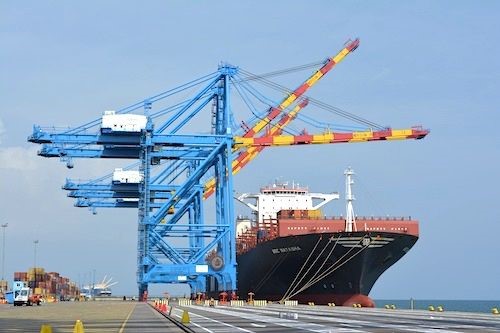… regulator wants withdrawal of charges but shipping lines remain adamant
The Ghana Shippers’ Authority (GSA) has asked Shipping Lines operating in the country not to slap the new Port Additional Charge (PAD) or liner charge on freight forwarders locally. Despite the directive, shipping lines are still moving forward with collection of the levy and others.
The call came after the GSA engaged some members of the Shipowners and Agents Association of Ghana (SOAAG) on a recent announcement by the Shipping Lines to increase their Port Additional Surcharges effective March 1, 2021, in response to the proposed Ghana Ports and Harbours Authority (GPHA) revision of port tariffs.
The Shipping Lines, from March 1, began implementing new tariffs of US$132 for a twenty-foot container and US$264 for a forty-foot container from US$77 and US$154 respectively. They have also announced their intention to commence the implementation of container transfer fees of US$50 as an inland additional import service charge, scheduled to be implemented from March 15 this year. The move is to cover their operational cost.
Four association leaders – made up of Concern Freight Forwarders and Transport (COFFT), Ghana Union of Traders Association (GUTA), Importers and Exporters Association of Ghana, as well as the Food and Beverages Association of Ghana (FABAG) – have indicated that they will not accept or pay any upward port additional surcharges.
During a joint press conference organised on Monday, they said the increment has no legal backing and authorization; and therefore they entreat all exporters, importers, freight forwarders and all partners within the logistics supply chain to disregard it.
The GSA has said in a communique to the Shipping Lines that, upon a careful analysis of the development, the hikes in these charges should be recovered by an adjustment to the freight and not a separate charge for the freight forwarder.
The GSA in their communique said: “The Authority, in a bid to appreciate the basis for this proposed PAD, engaged some members of SOAAG individually – seeing as the subject borders on commercial matters and the generic response has been that it is a recovery of the additional costs occasioned by the GPHA tariff increases, upon the recommendation/directive of their principals.
“While it is conventional for Shipping Lines the world over to institute Surcharges/Port Additional for any unforeseen occurrences that are likely to affect a voyage and impact their ability to maintain the quality of services to the trade, these costs are charged as part of the freight and not recoverable as separate charges at destination.
“As you are aware, the freight charge is inclusive of costs incurred at the ports such as berthing fees, pilotage, mooring, stevedoring charges etc.; therefore, any hikes in these charges should be recovered by an adjustment to the freight.”
The Authority added that in principle it is not against cost-recovery; however, it wishes to unequivocally state its disagreement with imposition of the Port Additional Charge as a local charge – or as some of the Shipping Agents indicated, a liner charge payable in Ghana.
The Authority is of the clear view that the PAD must be a component part of the freight, and shall not be charged at destination – unless it is a freight collect transaction. “We are therefore by this communication requesting the withdrawal of these charges which have been advertised to be paid locally,” the GSA intimated.
But it seems the Shipping Lines are adamant, as some have gone ahead to implement the new charges. They have asked their clients to pay under protest, as a resolution to the matter is being sorted.
Vice-President of the Ship Owners and Agents Association (SOAAG), Adam Imoru Ayarna, in an interview with the B&FT said that it will be difficult to abide by the application from the GSA, considering the fact that the new charges are from the principal – the headquarters of the shipping lines – and do not emanate from Ghana.
“The importer, one way or another, will pay the new charges; if not locally, from the country of origin. The Shipping Lines have had their own challenges; the extra cost they have to bear to be able to ship goods from the world to Ghana must be catered for. The Freight Forwarders are crying that COVID-19 has had a negative impact on their operations; they should also know that the Shipping Lines have had a hard time during this COVID era and our operations have gone up substantially, one of the reasons for the hike.”










